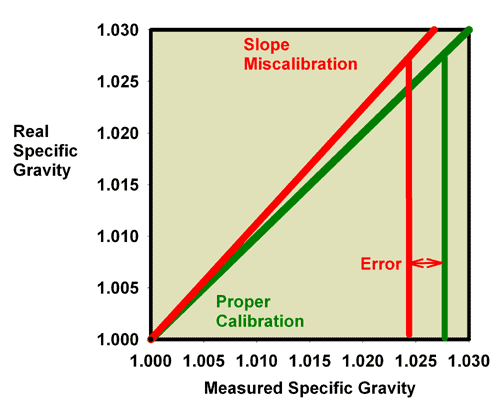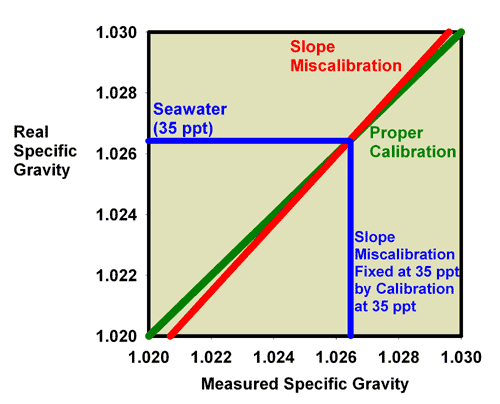In some cases, RO/DI or distilled water will be just as good, but that isn't necessarily the case. I think that is why this is still such a debated topic. For some reefers, this method is accurate, but for others it isn't. It really depends on the refractometer: calibrating with freshwater assumes that the refractometer is consistent across the entire range of measurement. There's a vast difference in measuring the refractive index of freshwater and measuring the RI of saltwater.
Check out
Randy Holmes-Farley's points on slope miscalibration. The long and short is that some refractometers may not be accurate over their entire range of measurement. That means by calibrating to 1.000SG you are ensuring that the reading is accurate at 1.000SG. However, as salinity goes up, small errors in accuracy become compounded, and get larger and larger:
In this hypothetical case, calibrating with freshwater produces inaccurate salinity readings. The refractometer will say your water is 1.026SG, when in reality it is closer to 1.024. Here is what happens when we correctly calibrate this hypothetical refractometer with calibration fluid:
Notice how the red and green lines are split at the bottom of the graph? What this means is that when you read freshwater with this hypothetical refractometer, it will actually read higher than 1.000SG. But that's okay. This refractometer is not consistent across its entire range. What we do know, however, is that the refractometer is exactly accurate at 1.026SG because we calibrated at that point with calibration fluid.
Calibrating with freshwater will still produce consistent results, and since consistency is really key with salinity, it likely won't hurt anything in your tank. However, it could produce inaccurate results. The only way freshwater calibration would produce accurate results at higher ranges is if your refractometer was consistent across the entire range of measurement. With hobby-grade refractometers, this is not a bet I'd be willing to take. There are some out there that will measure accurately at both ends of the scale, but I haven't had much luck finding one.
We spend hundreds to thousands of dollars on our reef setups. When calibration fluid is
just $7 shipped, calibrating with freshwater to get "close enough" just doesn't make any sense to me. But, to each his own.


